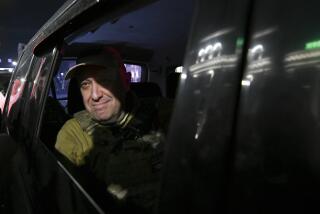Communist Party Boss of Russia Steps Down After Stormy Meeting : Soviet Union: Hard-liner apparently sacrifices himself to help deteriorating organization.
- Share via
MOSCOW — In a political bombshell, the hard-line Communist Party chief of Russia stepped down Tuesday, giving up his spot as the standard-bearer of Soviet reactionaries and depriving radicals of the “odious figure” they loved to hate.
With his surprise resignation at a party plenary meeting, longtime apparatchik , or party bureaucrat, Ivan K. Polozkov appeared to be sacrificing himself in an attempt to help his deteriorating party, already in the throes of a painful schism, gain some popularity before voters next go to the polls.
“It was a hard year for him and a hard year for the party,” Victor S. Bondarchuk, deputy chief of the party’s organizational department, said of Polozkov. “The mass media created an image of him as an enemy of reforms, and this image is not possible to overcome. So he decided to help his party by quitting his position.”
The Russian Communist Party’s Central Committee immediately elected as Polozkov’s replacement Valentin Kuptsov, a former metalworker from northern Russia who stressed, according to Bondarchuk’s account of the closed meeting, that “the Communist Party is not a ruling one nowadays and that its primary task now is to win the elections.”
It had been clear for months that Polozkov was not a political asset.
Dubbed an “odious figure” by one of his own comrades, Moscow party chief Yuri A. Prokofiev, Polozkov is fatally lacking in television appeal. His heavy jaw is permanently darkened by 5 o’clock shadow, he wears thick glasses and, although he is articulate, he has none of President Mikhail S. Gorbachev’s easy charm.
Even before he was elected Russian Communist Party chief last summer, Polozkov had earned a reputation as a reactionary in his home region of Krasnodar by ruthlessly stamping out the fledgling private businesses legalized under Gorbachev’s reforms and suppressing radical political activists.
Denying all the while that he wanted a return to Communist dictatorship, Polozkov became the most prominent spokesman of the hard line. In a speech in February, he said that Gorbachev’s reforms had failed and accused “international capital” of supporting anti-Communists, who consist largely, he said, of “the heirs of the overthrown classes, nationalists and dealers of the shadow economy.”
Polozkov’s unpopularity appeared to hasten the party’s decline, and his outspoken opposition to a new faction, the Democratic Party of Russian Communists, appeared to make a full-fledged split of the multimillion-member party unavoidable.
The impending schism developed into open political warfare Tuesday, with the party expelling the faction’s leader, Alexander Rutskoi, from the policy-making Central Committee, and the Democratic Communists, in turn, announcing that they now consider themselves “the opponents of the Russian Communist Party.”
But the ascension of Kuptsov, an apparent pragmatist, could signal a move away from confrontation.
Since mid-1990, the 53-year-old former shop foreman has been head of the department of the national Communist Party that deals with other political groups, a job that indicates he may have some skill at negotiating with political rivals. He also won an election to gain the seat he holds in the Soviet Parliament rather than being appointed, as were many of his party cohorts.
According to accounts of Tuesday’s plenum, Polozkov came under so much criticism throughout the day that he was led to announce his resignation as it ended.
“It was said that the presence of Ivan Polozkov at the helm of the party was harmful, so he had to be changed,” Prokofiev told the Interfax news agency.
The national Communist Party, which includes the Russian party organization that Polozkov headed, has already moved away from ideological clashes by adopting last month a radically altered program that eliminates much of the Marxist-Leninist catechism of old.
But the Russian branch, created only last year and estimated to make up half of the national party’s membership of about 15 million, is known as generally more conservative and immovable.
Bondarchuk said the party’s political bent means that its leader may always be painted as an arch-conservative by the liberal media. “Now the mass media will try to blacken the image of Kuptsov as well,” he said.
The Soviet media did seem to delight in bad-mouthing Polozkov. The liberal Moscow News called him “a short man of unimpressive appearance” and “an apparatchik to the bone.” The weekly Sobesednik said his only real support came from “the party and military-industrial elite.” The progressive New Times magazine said he was elected by “die-hards opposed to democratic reforms.”
Russian television news got in its last digs at Polozkov late Tuesday, noting that the Communist leader said in his speech earlier that “no one knows the way out of the (country’s) crisis.”
“True,” anchorman Alexander Gurnov said, “he didn’t specify: no one in the world, no one in the country or just no one in his party?”
The City Council of Moscow also made life difficult for Polozkov.
Although he needed to move to the capital to fulfill his role as the Russian party leader, the radical-controlled City Council repeatedly denied him the right to an apartment. He had finally arranged a trade last week with the man who took over his old job as party chief in Krasnodar.
The formal announcement of Polozkov’s resignation used the stock phrase that he “resigned in connection with transfer to other work” but did not specify his new job.
More to Read
Sign up for Essential California
The most important California stories and recommendations in your inbox every morning.
You may occasionally receive promotional content from the Los Angeles Times.












